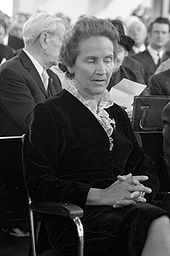- Marion Dönhoff
-
Marion Hedda Ilse Gräfin von Dönhoff (December 2, 1909 – March 11, 2002) was a German journalist who participated in the resistance against Hitler's National Socialists with Helmuth James Graf von Moltke, Peter Yorck von Wartenburg, and Claus Schenk Graf von Stauffenberg. After the war, she became one of the leading German journalists and intellectuals. She worked over 55 years for the Hamburg-based, weekly newspaper Die Zeit, as an editor and later publisher.
Contents
Biography
Dönhoff was born to an old aristocratic family ("Gräfin" means "Countess") in Schloss Friedrichstein, East Prussia in 1909. Dönhoff's father was Count August Karl von Dönhoff, a diplomat and member of the Prussian House of Lords and the German Parliament. As a diplomat, he was located in Washington for some time, and became a close friend of Senator Carl Schurz. Dönhoff wrote, in her memoirs, how her father was involved in one of the last episodes of the Indian wars, the White River War.[1] Her mother was Maria Gräfin von Dönhoff, born Von Lepel (1869–1940).
As a young woman, she studied economics at Frankfurt, where National Socialist sympathizers were said to have called her the "red countess" for her defiance once they gained power in 1933. She left Germany soon after, moving to Basel, Switzerland, where she earned her doctorate. But she returned to her family home at Quittainen (Kwitajny), East Prussia, in 1938, and joined the resistance movement, which led to questioning by the Gestapo after a failed assassination attempt on Hitler in 1944. Though many of her fellow resistance activists were executed, she was released. While she had secretly helped to develop the organization of the government that was to take over in East Prussia once the resistance succeeded in removing Hitler, her name was not found in any of the documents seized by the Nazis[citation needed]. Out of modesty, she had not presumed to have herself included, which modesty ended up saving her[citation needed].
In January 1945, as Soviet troops rolled into the region, Dönhoff fled East Prussia, travelling seven weeks on horseback before reaching Hamburg. She recounted her journey in a 1962 book of essays, recollecting her beloved homeland in what today is Russia (Kaliningrad oblast) and Poland (Warmia and Masuria). [2] Despite her deep emotional attachment to the region where she grew up, she was one of the first public figures to endorse the finality of the border between Germany and Poland, which had been established after the Second World War[citation needed].
In 1946, Dönhoff joined the fledgling, Hamburg-based, intellectual weekly Die Zeit as political editor. She was promoted later to deputy editor-in-chief in 1955, then editor-in-chief in 1968, and publisher in 1972. At the time of her death, Monday March 11, 2002 at the age of 92, Dönhoff was still co-publisher of the influential newspaper and was widely regarded as a voice of wisdom, tolerance and morality. She was the author of more than twenty books, including political and historical analyses of Germany as well as commentary on U.S. foreign policy. Among many international distinctions, Dönhoff was awarded honorary doctorates by Columbia University and Georgetown University.
Published works
English
- Kindheit in Ostpreußen – Before the Storm: Memories of My Youth in Old Prussia, translated by Jean Steinberg, foreword by George F. Kennan, 1990, ISBN 0394582551
- Foe into Friend: The Makers of the New Germany from Konrad Adenauer to Helmut Schmidt, translated by Gabriele Annan, Palgrave Macmillan, 1982, ISBN 0312296924
- Contributed to A UN Volunteer Force: The Prospects. New York Review of Books, July 15, 1993
German
- Namen die keiner mehr nennt, Eugen Diederichs Verlag, Köln 1962
- Weit ist der Weg nach Osten: Berichte und Betrachtungen aus fünf Jahrzehnten
- Preussen—Mass und Masslosigkeit, 1990
- Die Biene, Bibliogr. Inst. + Brockhaus, 1993, ISBN 3411086211
- Meyers Kleine Kinderbibliothek: Groß und Klein,Bibliographisches Institut & F.A. Brockhaus AG, 1993, ISBN 3411086416
- 'Um der Ehre willen', Erinnerungen an die Freunde vom 20 Juli., Berlin 1994,
Bibliography
- Marion Gräfin Dönhoff, 'Um der Ehre willen', Erinnerungen an die Freunde vom 20 Juli. Berlin 1994, Bundesrepublik
- Kilian Heck/Christian Thielemann (Hrsg.): Friedrichstein. Das Schloß der Grafen von Dönhoff in Ostpreußen. Deutscher Kunstverlag, München/Berlin 2006, ISBN 3-422-06593-8
- Fabian von Schlabrendorff, Offiziere gegen Hitler, a.a. O., 1945/1990 Bundesrepublik
The book Jews In Germany From Roman Times To The Weimar Republic by Nachum T. Gidal, Bertelsmann 1988, Könemann 1998, contains a Preface by Marion Gräfin Dönhoff.
Notes
- www.germany-info.org, The Week in Germany for March 15, 2002
References
- ^ Kindheit in Ostpreußen – Before the Storm: Memories of My Youth in Old Prussia ("Childhood in East-Prussia"), translated by Jean Steinberg, foreword by George F. Kennan, 1990, ISBN 0394582551.
- ^ The castle is 19 km (12 mi) from Kaliningrad.
Categories:- 1909 births
- 2002 deaths
- German journalists
- German nobility
- German Resistance members
- People from East Prussia
- Recipients of the Peace Prize of the German Book Trade
Wikimedia Foundation. 2010.

